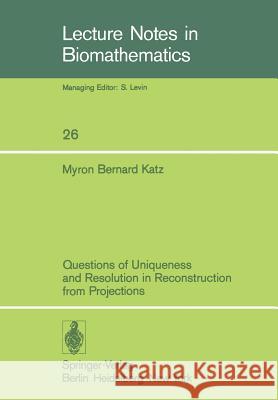Questions of Uniqueness and Resolution in Reconstruction from Projections » książka
Questions of Uniqueness and Resolution in Reconstruction from Projections
ISBN-13: 9783540090878 / Angielski / Miękka / 1978 / 180 str.
Reconstruction from projections has revolutionized radiology and as now become one of the most important tools of medical diagnosi- he E. M. I. Scanner is one example. In this text, some fundamental heoretical and practical questions are resolved. Despite recent research activity in the area, the crucial subject *f the uniqueness of the reconstruction and the effect of noise in the ata posed some unsettled fundamental questions. In particular, Kennan mith proved that if we describe an object by a C~ function, i. e. , nfinitely differentiable with compact support, then there are other bjects with the same shape, i. e. , support, which can differ almost rhitrarily and still have the same projections in finitely many direc- ions. On the other hand, he proved that objects in finite dimensional unction spaces are uniquely determined by a single projection for almost 11 angles, i. e. , except on a set of measure zero. Along these lines, erman and Rowland in [41) showed that reconstructions obtained from he commonly used algorithms can grossly misrepresent the object and hat the algorithm which produced the best reconstruction when using oiseless data gave unsatisfactory results with noisy data. Equally mportant are reports in Science, [67, 68) and personal communications y radiologists indicating that in medical practice failure rates of econstruction vary from four to twenty percent. within this work, the mathematical dilemma posed by Kennan Smith's esult is discussed and clarified.











